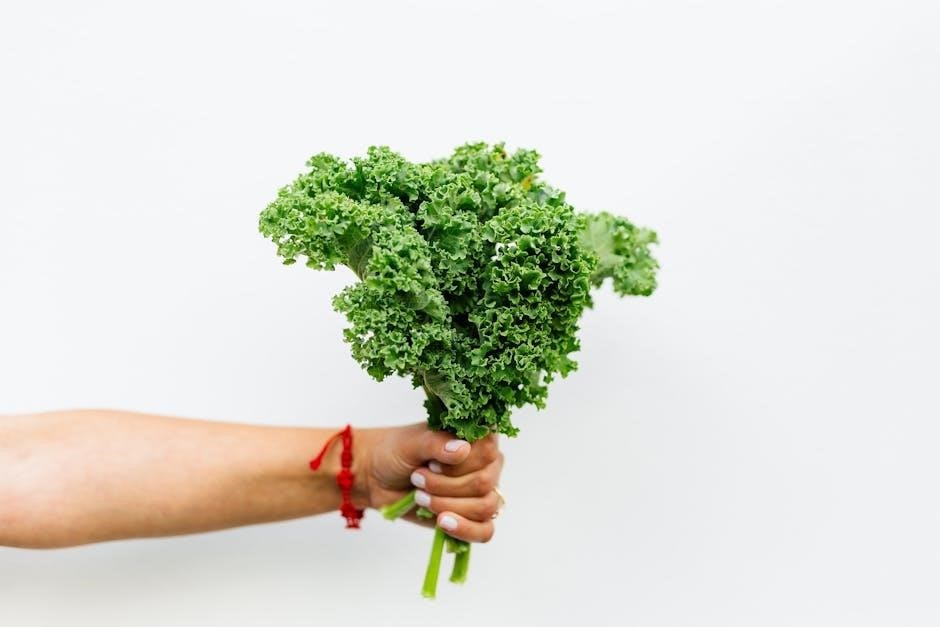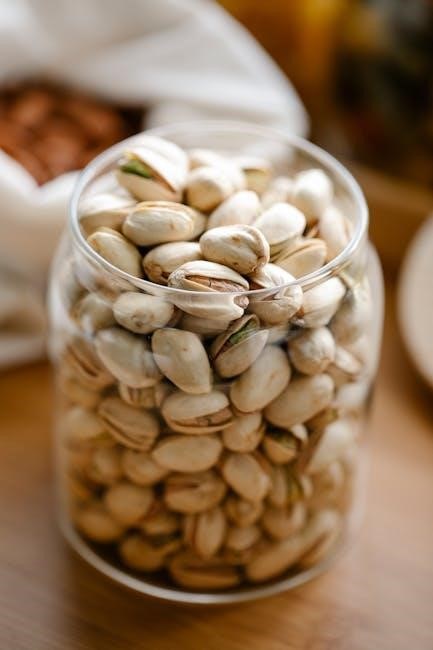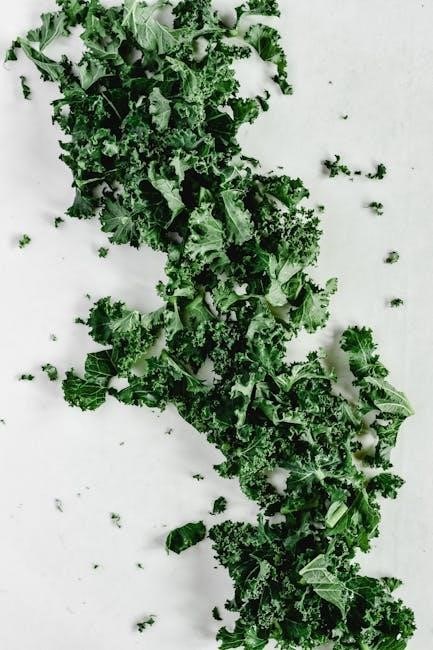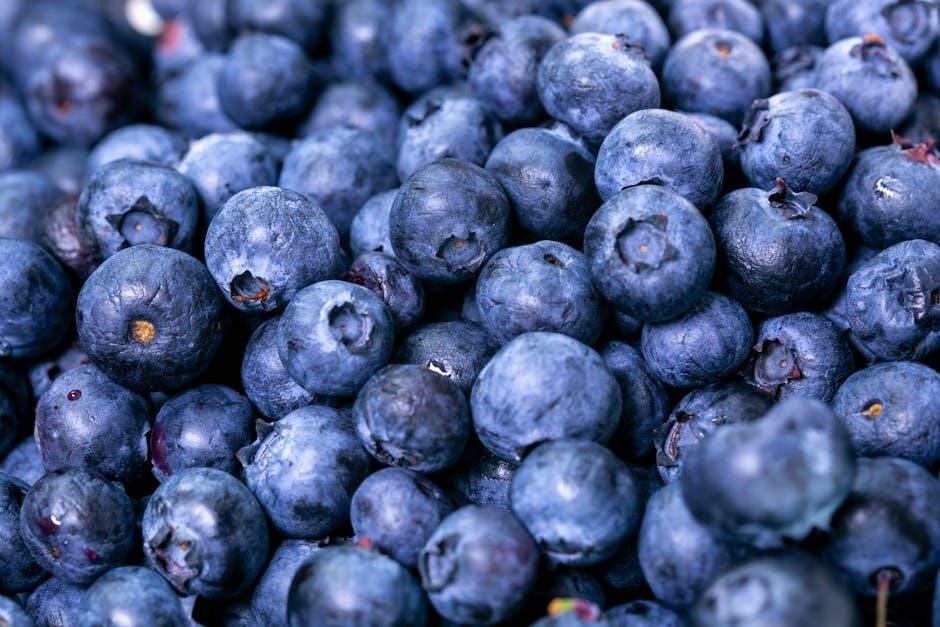The vegetarian keto diet combines ketogenic principles with plant-based eating, focusing on low-carb, high-fat, and moderate-protein foods. It’s tailored for meat-free individuals seeking weight loss, improved health, and tailored resources like free PDF guides.

Benefits of Vegetarian Keto Diet
The vegetarian keto diet promotes weight loss, enhances blood sugar regulation, and boosts energy levels by focusing on low-carb, high-fat plant-based foods, supported by free PDF guides.
Weight Loss
The vegetarian keto diet is highly effective for weight loss, as it induces a metabolic state called ketosis, where the body burns fat for energy instead of carbs. By focusing on low-carb, high-fat plant-based foods, individuals often experience rapid weight loss due to reduced insulin levels and increased fat metabolism. The diet also naturally reduces hunger, making it easier to stick to calorie goals. Many free PDF guides provide structured meal plans to help individuals achieve and maintain ketosis, ensuring steady weight loss. With keto-friendly options like tofu, avocados, and nuts, the vegetarian keto diet offers a sustainable path to shedding pounds while enjoying flavorful meals.
The vegetarian keto diet is renowned for its ability to stabilize blood sugar levels by minimizing carbohydrate intake, which directly impacts glucose production. Low-carb, high-fat meals reduce insulin spikes, helping regulate blood sugar naturally. This makes the diet particularly beneficial for those with type 2 diabetes or prediabetes. Many free PDF guides offer tailored meal plans to ensure balanced macronutrient intake, further enhancing blood sugar stability. By eliminating refined sugars and focusing on whole, nutrient-dense foods like vegetables, nuts, and tofu, individuals can achieve consistent blood sugar levels. This dietary approach not only aids in weight loss but also supports long-term metabolic health, making it a popular choice for those seeking improved glycemic control. Regular monitoring and adherence to the plan are key to maximizing these benefits. The vegetarian keto diet often leads to increased energy levels due to its focus on high-fat, low-carbohydrate foods, which promote sustained energy production. By reducing reliance on glucose, the body adapts to using ketones as a primary fuel source, minimizing energy crashes. Healthy fats like avocados, nuts, and seeds provide long-lasting energy, while protein sources such as tofu and tempeh support muscle function. Many free PDF guides emphasize meal plans that balance macronutrients to maintain steady energy throughout the day. This dietary approach helps avoid the energy fluctuations typically associated with high-carb diets, making it ideal for individuals with active lifestyles. With proper planning, the vegetarian keto diet can enhance vitality and reduce fatigue effectively. The vegetarian keto diet presents challenges such as maintaining adequate protein intake, managing social eating situations, and ensuring proper nutrient balance. These require careful planning and creativity. Maintaining adequate protein intake on a vegetarian keto diet can be challenging due to the exclusion of meat and fish. However, there are several plant-based protein sources that can help meet daily requirements. Tofu, tempeh, edamame, nuts, seeds, and cheese are excellent options. Incorporating these into meals ensures sufficient protein intake. Additionally, low-carb vegetarian protein powders can be used as supplements. It is important to track protein consumption to avoid deficiencies. Meal planning is crucial to balance macros and ensure protein-rich foods are included in every meal. By diversifying protein sources and carefully structuring meals, vegetarians can thrive on a keto diet. A well-designed meal plan, such as those found in free PDF guides, can provide practical solutions and recipes to maintain adequate protein intake. Managing social and cultural eating situations on a vegetarian keto diet can be challenging, as many traditional dishes are high in carbs or contain meat. However, with preparation and creativity, it is possible to navigate these situations successfully. Bringing a keto-friendly dish to gatherings ensures there is always something suitable to eat. Communicating dietary preferences with hosts can also help avoid awkward situations. Additionally, many cultures offer vegetarian and low-carb options that can be adapted to fit keto guidelines. Free PDF resources and meal plans often include tips for social eating, making it easier to stay on track while enjoying meals with others. By being proactive and informed, vegetarians can maintain their keto lifestyle without feeling excluded. This approach fosters a balance between cultural traditions and dietary goals. Maintaining proper nutrient balance on a vegetarian keto diet requires careful attention to avoid deficiencies. Focus on whole, nutrient-dense foods like leafy greens, nuts, seeds, and low-carb vegetables. Vitamin B12, iron, and omega-3 fatty acids are particularly important, as they may be lacking in plant-based diets. Incorporate fortified foods or supplements for B12 and consider flaxseeds or walnuts for omega-3s. Additionally, ensure adequate fiber intake through low-carb vegetables and seeds. A well-planned meal structure, guided by free PDF resources, can help simplify this process. Tracking macros and consulting with a nutritionist can further ensure you meet your nutritional needs while staying in ketosis. Regularly reviewing your diet and making adjustments as needed will help maintain a balanced and sustainable vegetarian keto lifestyle. Proper planning prevents deficiencies and supports overall health and well-being. Finding adequate protein sources is essential on a vegetarian keto diet. Tofu, tempeh, and edamame are excellent options, as they are high in protein and fit within keto guidelines. Nuts and seeds, such as almonds, chia seeds, and flaxseeds, are versatile and protein-rich, though portion control is key due to their carb content. Seitan, a meat substitute made from wheat gluten, is another great choice. Additionally, protein-rich vegetables like spinach and broccoli can contribute to your daily intake. For those who consume dairy, full-fat Greek yogurt and cottage cheese are also viable options. Incorporating a variety of these foods ensures a balanced and satisfying vegetarian keto diet, making it easier to meet your protein goals without compromising on flavor or nutrition; These options are widely available and can be easily incorporated into meal plans outlined in free PDF guides; A well-structured meal plan is crucial for success on a vegetarian keto diet. Use free PDF guides to organize daily meals, ensuring macronutrient balance and variety. A well-structured daily meal plan is essential for maintaining ketosis on a vegetarian keto diet. Start with a high-protein breakfast, such as tofu scramble or keto-friendly pancakes. For lunch, focus on salads with healthy fats like avocado and nuts, paired with plant-based proteins like tempeh or edamame. Snacks should include low-carb options like cheese, seeds, or veggie sticks with dips. Dinner can feature vegetable-based dishes with meat substitutes or eggplant parmesan. Ensure every meal balances macronutrients, keeping carbs low, fats high, and protein moderate. Hydration and electrolyte balance are also crucial. Use free PDF guides to track macros and stay consistent, ensuring variety to avoid monotony and maintain nutritional balance. This structure helps sustain energy and supports weight loss goals effectively. A 7-day vegetarian keto meal plan offers a structured approach to staying in ketosis while enjoying diverse flavors. Day 1 includes a tofu scramble breakfast, zucchini noodles with pesto for lunch, and stuffed bell peppers for dinner. Day 2 features cauliflower pancakes, avocado soup, and eggplant parmesan. Day 3 brings spinach and mushroom omelets, tofu quiche, and vegetable stir-fry with tempeh. Day 4 includes kale smoothies, stuffed zucchini boats, and cauliflower mac and cheese. Day 5 offers chia pudding, lentil-free veggie burgers, and shirataki pasta. Day 6 includes avocado toast, spinach and artichoke salad, and portobello mushrooms. Day 7 wraps up with coconut pancakes, cucumber soup, and black bean sauce with vegetables. Free PDF guides provide detailed recipes and macros for each meal, ensuring a balanced and delicious ketogenic experience. Vegetarian keto breakfasts are both satisfying and nutritious, offering a great start to the day. Popular options include tofu scramble, seasoned with turmeric and spices for an egg-like flavor, served with avocado slices. Avocado toast on low-carb, keto-friendly bread is another favorite, topped with cherry tomatoes and olive oil. For a sweeter option, keto chia pudding with coconut milk and berries provides a healthy, filling choice. Cauliflower pancakes, made with grated cauliflower and almond flour, are a creative twist on traditional breakfast fare. Additionally, spinach and mushroom omelets or cheesy zucchini omelets offer a protein-packed start. Free PDF guides often include these recipes, along with detailed instructions and macronutrient breakdowns, making it easy to plan and enjoy a balanced vegetarian keto breakfast every day. Vegetarian keto lunches are versatile and flavorful, ensuring you stay on track with your dietary goals. A popular option is tofu quiche, packed with spinach and cheese, offering a protein-rich meal. Avocado soup, blended with coconut cream and vegetables, provides a creamy, satisfying choice. For a light yet filling option, consider stuffed bell peppers with cauliflower rice, cheese, and spices. Zucchini boats filled with a mixture of ricotta, Parmesan, and herbs are another creative choice. Additionally, keto eggplant lasagna layers sliced eggplant with cheese and marinara for a hearty meal. Many free PDF guides include these recipes, along with step-by-step instructions and macronutrient details, making meal planning effortless and enjoyable. These ideas ensure variety and nutrition, keeping you satisfied throughout the day. Vegetarian keto dinners are both satisfying and nutritious, offering a variety of flavors to end your day. One popular option is stuffed bell peppers, filled with cauliflower rice, cheese, and spices for a hearty meal. Zucchini boats are another creative choice, hollowed out and filled with a mixture of ricotta, Parmesan, and herbs. For a comforting dish, try keto eggplant lasagna, layering sliced eggplant with marinara, cheese, and seasonings. Vegetable stir-fries with tofu or tempeh, cooked in coconut oil or avocado oil, offer a quick and flavorful option; Many free PDF guides provide detailed recipes for these meals, complete with macronutrient breakdowns and step-by-step instructions. These dinner ideas ensure you stay within keto guidelines while enjoying delicious, plant-based meals. Snacking on a vegetarian keto diet can be both satisfying and healthy. Cheese sticks and handfuls of nuts like almonds or macadamia nuts are convenient and fit within keto macros. Vegetable sticks with dips like guacamole or ranch made from avocado oil are great options. For something sweet, keto fat bombs made with coconut oil and cocoa butter are a delicious treat. Many free PDF guides offer creative snack recipes, such as keto crackers or chocolate mousse, ensuring variety and adherence to dietary guidelines. These snacks not only curb cravings but also keep you in ketosis, making them ideal for a vegetarian keto lifestyle. Indulging in desserts on a vegetarian keto diet is possible with creative, low-carb recipes. Many free PDF guides include treats like chocolate silk pie and dairy-free chocolate mousse, made with ingredients such as avocado, cocoa powder, and coconut cream. Keto fat bombs, often flavored with vanilla or citrus, are another popular option. These desserts focus on healthy fats and minimal carbs, ensuring they fit within keto macros. Additionally, keto-friendly fruit-based desserts, like berry parfaits with nuts or chia pudding, provide natural sweetness without compromising ketosis. These sweet treats not only satisfy cravings but also align with the vegetarian keto lifestyle, making them a guilt-free choice for those following the diet. They are perfect for special occasions or everyday indulgence, proving that keto desserts can be both delicious and compliant. A well-organized grocery list is essential for maintaining a vegetarian keto diet. Focus on high-quality, whole-food ingredients like tofu, tempeh, nuts, seeds, avocados, and low-carb vegetables. Include healthy fats such as olive oil, coconut oil, and avocado oil. Protein sources like seitan and edamame are also great additions. Stock up on low-carb greens such as spinach, kale, and broccoli, which are rich in nutrients. Dairy-free alternatives like coconut yogurt and almond milk can be included for variety. Don’t forget keto-friendly condiments and spices to enhance flavor. Many free PDF guides provide detailed shopping lists tailored to this diet, ensuring you stay on track. Always check the carb count of packaged items to maintain ketosis. A structured grocery list helps simplify meal planning and ensures you have everything needed for delicious, compliant meals. Regular physical activity is a key component of a successful vegetarian keto diet. Exercise not only enhances fat burning but also improves overall health and energy levels. Aim for a mix of aerobic exercises, strength training, and flexibility routines. Activities like yoga, cycling, and brisk walking are ideal for maintaining ketosis while promoting weight loss. Resistance training with bodyweight or low-carb-friendly protein powders can help build muscle. Many free PDF guides include workout plans tailored to the vegetarian keto lifestyle, ensuring you stay active and motivated. Combining a balanced diet with consistent exercise can maximize results and support long-term wellness. Always consult a nutritionist or fitness expert to create a personalized plan that aligns with your goals. Supplements can play a crucial role in supporting a vegetarian keto diet, ensuring adequate nutrient intake. Exogenous ketones can help maintain ketosis, especially during the initial phases. Omega-3 fatty acids from plant-based sources like flaxseed or algae oil are essential for heart health. Vitamin B12 is vital for energy and nerve function, as it’s primarily found in animal products. Fiber supplements can aid digestion, while magnesium and potassium help combat keto flu symptoms. For protein needs, plant-based protein powders like pea or hemp are excellent options. Additionally, probiotics support gut health, which is important on a low-carb diet. Always consult a healthcare provider before starting any supplement regimen to ensure it aligns with your dietary goals. Many free PDF guides offer recommendations for the best supplements to complement your vegetarian keto journey. When following a vegetarian keto diet, it’s important to avoid common pitfalls to ensure success. Overconsumption of carbs is a frequent mistake, as even small portions of high-carb vegetables or snacks can kick you out of ketosis. Not tracking macros can lead to imbalanced fat, protein, and carb intake, hindering weight loss and ketosis. Low fat intake is another error, as fats are crucial for energy and satiety on a keto diet. Insufficient protein intake can result in muscle loss, while overeating protein may impede ketosis. Many free PDF guides emphasize avoiding these mistakes and provide practical tips to stay on track. Staying informed and mindful of these common errors helps maintain a balanced and effective vegetarian keto lifestyle. Proper planning and awareness are key to achieving your dietary goals. Encountering challenges on a vegetarian keto diet? Plateaus or lack of progress often result from hidden carb intake or inconsistent macronutrient tracking. Ensure accurate carb counting and adjust portions if necessary. Fatigue or low energy may indicate inadequate fat consumption or insufficient electrolyte intake. Incorporate more healthy fats and consider supplementing with magnesium and potassium. Difficulty staying in ketosis can be addressed by reducing carb servings and increasing high-fat foods. Many free PDF guides offer troubleshooting tips and meal ideas to overcome these hurdles. If struggling with protein intake, explore plant-based sources like tofu or tempeh. Staying hydrated and listening to your body are also crucial for long-term success. By addressing these common issues, you can refine your approach and maintain a balanced vegetarian keto lifestyle. Staying hydrated is essential on a vegetarian keto diet, as the body sheds excess water due to reduced carbohydrate intake. Aim for at least 8-10 glasses of water daily and consider incorporating electrolyte-rich beverages to maintain balance. Herbal teas, low-carb vegetable broths, and lemon water are great alternatives to plain water. Many free PDF guides emphasize the importance of hydration for preventing symptoms like fatigue or headaches. Additionally, include foods naturally high in water content, such as cucumbers, celery, and leafy greens, to support hydration. Monitoring your urine color and ensuring it remains pale yellow can help verify proper hydration levels. Don’t forget to track your water intake alongside macros for optimal results. Tracking macronutrients is crucial for success on a vegetarian keto diet. Aim for a macronutrient breakdown of 70-80% fats, 15-20% protein, and 5-10% net carbs. Use apps like MyFitnessPal or KetoDiet to monitor your intake. Ensure protein sources like tofu, tempeh, and nuts fit within your daily limits. Net carbs, calculated by subtracting fiber from total carbs, must stay low to maintain ketosis. Many free PDF guides provide detailed macro breakdowns for each meal, simplifying the process. Consistency is key, so track every meal and snack to stay on target. Regular adjustments may be needed to achieve or maintain ketosis, especially as your body adapts. Accurate tracking ensures you meet your dietary goals and supports overall success on the vegetarian keto journey. The vegetarian keto diet can positively impact mental health by reducing anxiety and improving focus. The high-fat intake supports brain function, while stable blood sugar levels prevent mood swings. Many adherents report enhanced mental clarity and reduced stress. However, it’s important to maintain a balanced approach to avoid restrictive eating patterns, which can negatively affect mental well-being. Ensuring adequate nutrition and variety in meals helps maintain a healthy mindset. Additionally, the structured nature of the diet can provide a sense of control and accomplishment. For those with a history of eating disorders, consulting a mental health professional is recommended to ensure a positive experience. Overall, the vegetarian keto diet can support mental health when approached mindfully and with proper guidance. Free PDF resources for the vegetarian keto diet provide comprehensive guides, meal plans, and tips to help you succeed. These resources often include detailed 7-day meal plans, grocery lists, and recipes tailored to a plant-based ketogenic lifestyle. Many PDFs offer macro breakdowns, ensuring you meet your dietary goals. They also cover basics like understanding ketosis, food swaps, and common mistakes to avoid. Some resources include printable charts and trackers for monitoring progress. Additionally, these guides often highlight versatile ingredients like tofu, tempeh, and low-carb vegetables, offering creative meal ideas. Whether you’re a beginner or looking to refresh your routine, free PDF resources make adopting and maintaining a vegetarian keto diet accessible and straightforward. They are a valuable tool for anyone aiming to transition to or stay on this unique dietary path. The vegetarian keto diet offers a unique approach to weight loss and improved health, blending low-carb, high-fat principles with plant-based eating. With free PDF resources widely available, individuals can easily access structured meal plans, recipes, and expert advice. These guides simplify the transition to a ketogenic lifestyle, ensuring adherence to macronutrient goals. By focusing on protein sources like tofu and tempeh, and incorporating healthy fats, vegetarians can achieve ketosis without compromising their dietary preferences. The diet not only aids in weight management but also promotes better blood sugar control and energy levels. While challenges like maintaining adequate protein intake exist, proper planning and resource utilization can overcome them. Embracing this diet requires commitment, but with the right tools and mindset, it can lead to sustainable health benefits and a balanced, fulfilling lifestyle.Improved Blood Sugar Control
Increased Energy Levels
Challenges of Vegetarian Keto Diet
Maintaining Adequate Protein Intake
Managing Social and Cultural Eating Situations
Ensuring Proper Nutrient Balance

Protein Sources on a Vegetarian Keto Diet
Meal Planning Strategies
Daily Meal Structure
7-Day Sample Meal Plan
Breakfast Ideas

Lunch Ideas
Dinner Ideas

Snacks
Desserts
Grocery List

Exercise and Activity

Supplements
Common Mistakes to Avoid
Troubleshooting

Hydration

Tracking Macros

Mental Health
Free PDF Resources
